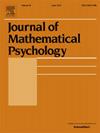Nondistributivity of human logic and violation of response replicability effect in cognitive psychology
Abstract
The aim of this paper is to promote quantum logic as one of the basic tools for analyzing human reasoning. We compare it with classical (Boolean) logic and highlight the role of violation of the distributive law for conjunction and disjunction. It is well known that nondistributivity is equivalent to incompatibility of logical variables — the impossibility to assign jointly the two-valued truth values to these variables. A natural question arises as to whether quantum logical nondistributivity in human logic can be tested experimentally. We show that testing the response replicability effect (RRE) in cognitive psychology is equivalent to testing nondistributivity — under the prevailing conjecture that the mental state update generated by observation is described as orthogonal projection of the mental state vector (the projective update conjecture of Wang and Busemeyer). A simple test of RRE is suggested. In contrast to the previous works in quantum-like modeling, we proceed in the state-dependent framework; in particular, distributivity, compatibility, and RRE are considered in a fixed mental state. In this framework, we improve the previous result on the impossibility to combine question order and response replicability effects by using (von Neumann–Lüders) projective measurements.

 求助内容:
求助内容: 应助结果提醒方式:
应助结果提醒方式:


